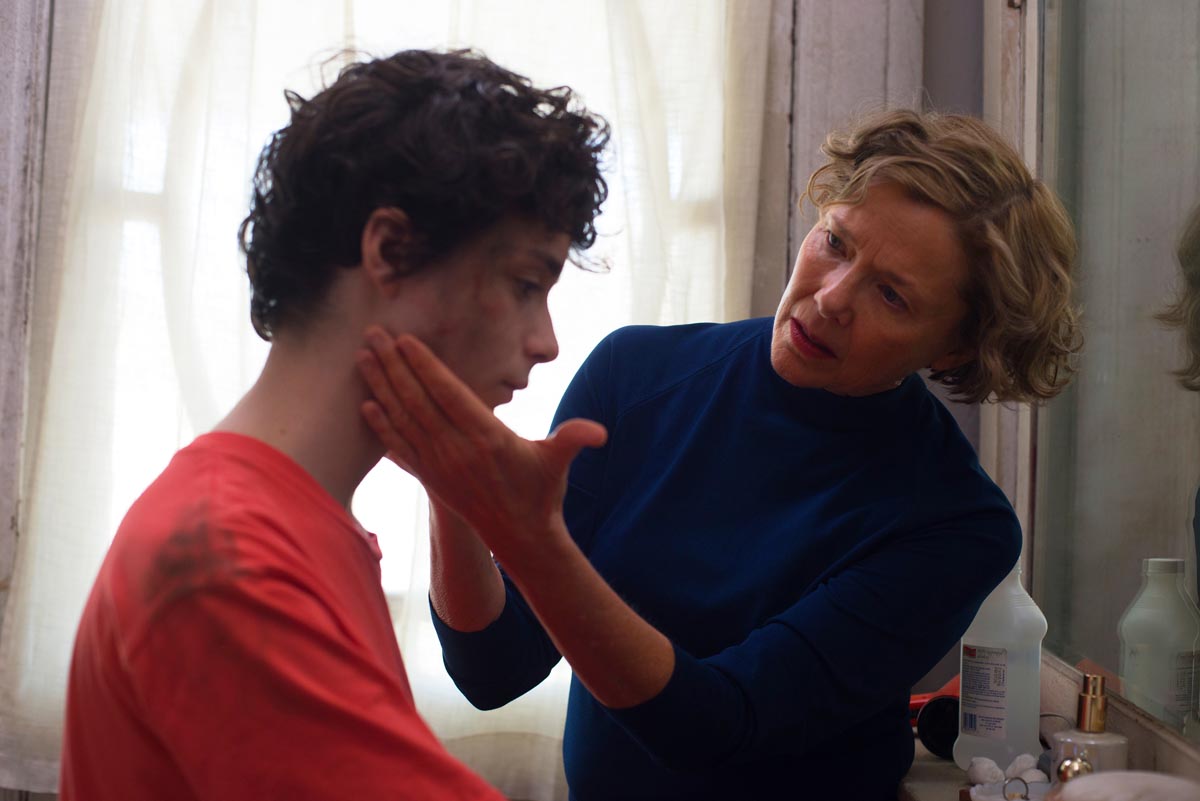There really are times in which I think I’ve seen it all … and then the screen shows me two teenage boys fist fighting over “proper clitoral stimulation.” Right about now, I’d worry about my audience, except that I’d estimate there’s a 0% chance if you got this far that you don’t know what a clitoris is or where to find it. 20th Century Women is the kind of film in which Greta Gerwig shouts at all the men at a crowded dinner table to get comfortable with the word “menstruation.”
Do I have to go on here? I mean, you either understand that and find it funny as I did or in one word you now have no interest in seeing this film at all. Am I right? Forget it. I’ll go on anyway.
20th Century Women begins with a car on fire in a shopping market parking lot. Could be worse. Last fall I found myself stranded with groceries and an inoperable vehicle; the towing company brought me to the dealership, where I was still stuck stranded with my groceries. (The dealership in question offered neither support, nor a ride to public transportation. I won’t tell you which dealership specifically treated their customer so poorly, but it rhymes with “shmoliseum shmexus of shmoakland.”) In the film, single mother Dorothea (Annette Bening) and her 16-year-old son Jamie (Lucas Jade Zumann) get driven home –with the groceries—by the fire department. Yes, I am jealous. Thanks for asking.
Jamie has an odd life; he’s at an age of sexual curiosity and increasing awareness of the (mostly female) world around him which includes mom’s eccentricities, but he’s almost literally friendless and directionless. Mom admits she might not be up to parenting the boy all by herself these days, and calls upon two women much closer in age to Jamie: Abbie (Gerwig), a roomer suffering from cervical cancer, and Julie (Elle Fanning), an 18-year-old free spirit who, unbeknownst to mom, often sleeps with her son. And by “sleeps,” I really mean sleeps. Lies right beside him, sleeping, talking, no touching. And Jamie is in love with Julie. The movie knows it is cruel for Julie to climb into his bed expecting nothing but company. There’s a fine line here, isn’t there? 1979 Santa Barbara certainly has a healthy respect for women’s rights—the sixteen-year-old boy can’t possibly make any demands for contact … however, he is a sixteen-year-old boy, he finds her attractive and she’s voluntarily in his bed every.single.night. And given her age and his infatuation, she’s in control of this relationship. What about his rights? There is definitely a mild form of abuse going on. Sweet, sweet abuse.
For a feminine anthem of sorts, 20th Century Women was a great deal more forgiving than I’d have guessed. Films with similar tend to be “battle of he sexes” material; this was nothing of the sort. Part of the forgiving nature is the screenplay, accessible to both sexes for most of the film, and part of it is Dorothea herself. Annette Bening approaches every event not as a stereotype, but rather as if she’s an alien trying to discern if what she’s heard is good news or bad. “Hmmmm, my teenage son has taken the car and run off with an older vixen … is this a good thing or a bad thing? Hmmmm. Better think about it some more …” While the approach was unfamiliar to me, I found it quite refreshing. It’s like for every stimulus, there were several people inside her head debating the ramifications and rarely coming down firmly on one side or the other.
Bening approaches every event not as a stereotype, but rather as if she’s an alien trying to discern if what she’s heard is good news or bad. “Hmmmm, my teenage son has taken the car and run off with an older vixen … is this a good thing or a bad thing? Hmmmm. Better think about it some more …” While the approach was unfamiliar to me, I found it quite refreshing. It’s like for every stimulus, there were several people inside her head debating the ramifications and rarely coming down firmly on one side or the other.
20th Century Women was mostly about the players, yet occasionally it delved into their societal roles. For better or worse, the film does get political, not necessarily on behalf of women’s rights as one might expect, but instead coming to a conclusion I’d never thought about – the election of Ronald Reagan in 1980 ushered in an age of shallow that we as a people have never recovered from. That conclusion would have seemed like lunacy to me a year ago. Now? Damn. Spot on.
♪Makin’ up parenting I turn gray
Needin’ a new car most ev’ry day
I need help and this stuff ain’t much fun
Raisin’ a son (Raisin’ a son)
Raisin’ a son (Raisin’ a son)
My boy Jamie’s into fem-lit
Got beat up badly because of it
He digs blondes and hangs ‘round one a ton
Raisin’ a son (Raisin’ a son)
Raisin’ a son (Raisin’ a son)♫
Rated R, 119 Minutes
D: Mike Mills
W: Mike Mills
Genre: Getting comfortable with sex ed vocabulary
Type of person most likely to enjoy this film: Middle-aged suburban single mothers
Type of person least likely to enjoy this film: Boys
♪ Parody inspired by “Draggin’ the Line”



